Want to automate your e-commerce social media with AI? Inside, discover 15 tools that boost engagement, save you time, and drive real ROI in 2025.
Managing social media for your e-commerce brand shouldn’t feel like a second full-time job, but for many, it does. Between writing captions, editing product photos, and chasing that “always-on” brand presence, it’s easy to get stuck in a cycle that drains time without moving the needle. Meanwhile, your competitors seem to be posting effortlessly—and getting better engagement.
The reality? 71% of social media images are now AI-generated, and businesses using AI see 15% to 25% higher engagement rates compared to traditional methods. The game has changed. Forward-thinking e-commerce brands are using AI to turn social media into a revenue-driving engine, not a time sink.
This comprehensive guide will walk you through 15 AI-powered social media management tools specifically chosen for e-commerce businesses. We'll cover everything from content creation and visual design to scheduling automation and ROI tracking. By the end, you'll have a clear roadmap to automate 80% of your social media tasks while actually increasing your sales and engagement.
What You'll Learn in This Guide
- 15 AI tools categorized by e-commerce use case and budget
- ROI calculation frameworks to measure social media profit impact
- Step-by-step automation workflows for Shopify and e-commerce stores
- Bonus integration strategies to connect social media with your advertising campaigns
What Is an AI Social Media Manager?
An AI social media manager is a software platform that uses artificial intelligence and machine learning algorithms to automate, optimize, and manage social media tasks without constant human intervention. These tools can create content, schedule posts, analyze performance, engage with customers, and even track sales attribution – all while learning from your brand's unique voice and audience preferences.
For e-commerce businesses, AI social media management goes beyond simple post scheduling. It's about creating a systematic approach that connects your social media presence directly to revenue generation. Think automated product showcases, personalized customer interactions, and intelligent content optimization that adapts based on what actually drives sales for your store.
The numbers don't lie – 55% of businesses already use AI for social media posts, and early adopters are seeing significant advantages. These tools can analyze thousands of data points to determine the best times to post, which products to feature, and even what tone of voice resonates most with your audience.
Pro Tip: Focus on tools that integrate with e-commerce platforms for seamless product promotion. The best AI social media managers for online stores can automatically pull product information, pricing, and inventory status to create timely, relevant content.
The E-commerce Social Media Challenge
Let's be honest about what you're really dealing with as an e-commerce business owner. You need to maintain an active presence across multiple platforms – Instagram, Facebook, TikTok, Pinterest, maybe LinkedIn for B2B products. Each platform has its own optimal posting times, content formats, and audience expectations. Multiply that by the need to showcase dozens or hundreds of products, and you've got a full-time job just on social media alone.
The traditional approach is unsustainable. Manual posting means you're either spending 3-4 hours daily on social media tasks, or you're posting inconsistently and watching your engagement plummet. Neither option helps you grow your business. Plus, there's the attribution nightmare – how do you know which social media efforts actually drive sales versus just vanity metrics like likes and follows?
This challenge is driving massive investment in AI solutions. The AI social media market is projected to reach $12 billion by 2031, with e-commerce businesses leading the adoption charge. Why? Unlike other industries, e-commerce has clear, measurable outcomes. Every social media interaction can potentially be traced to a sale, making ROI calculation much more straightforward.
The solution isn't to abandon social media – it's to work smarter, not harder. AI tools can handle the repetitive tasks while you focus on social media strategy, customer relationships, and growing your business. The key is choosing the right combination of tools that work together to create a seamless, automated system.
Content Creation & Writing Tools
Creating engaging social media content consistently is where most e-commerce owners hit their first major roadblock. You need product descriptions that sell, captions that engage, and content that speaks to your specific audience – all while maintaining your brand voice across hundreds of posts per month.
1. Copy.ai
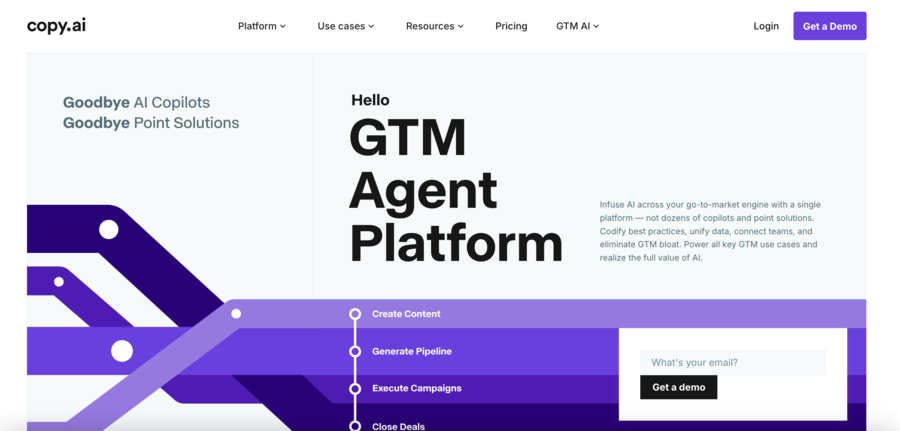
Best for: E-commerce templates and product-focused content
Pricing: $49/month for Starter plan
E-commerce Features: Pre-built templates for product launches, seasonal campaigns, and customer testimonials
Copy.ai stands out for e-commerce because of its specialized templates. You can input basic product information and get multiple variations of social media posts, from Instagram captions to Facebook ad copy. The tool understands e-commerce language patterns and can create urgency-driven content that actually converts.
Pros: Excellent template library, integrates with Shopify, and bulk content generation
Cons: Can feel formulaic without customization, limited visual content creation
2. Jasper
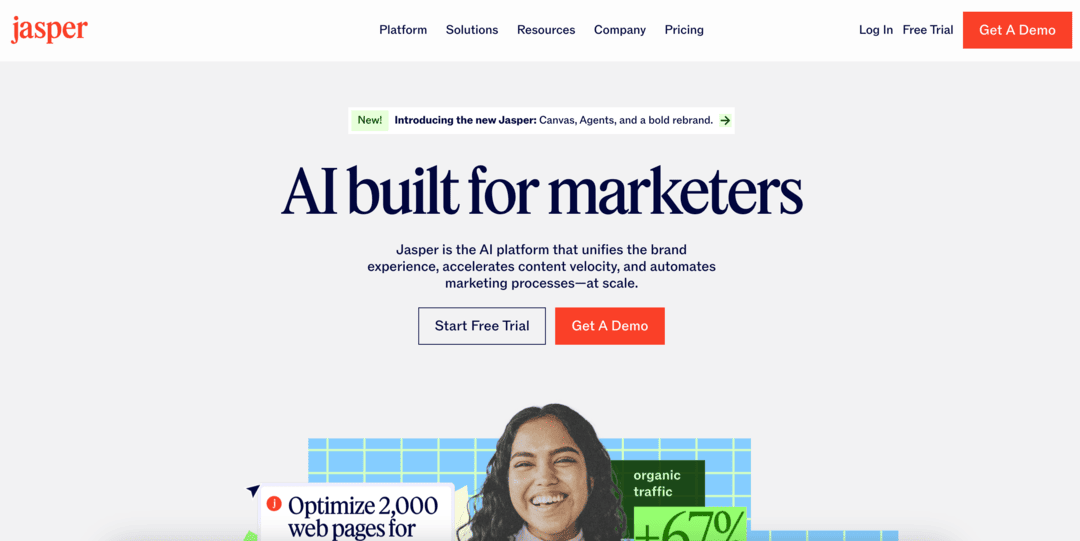
Best for: Long-form content and detailed product descriptions
Pricing: $49/month for Creator plan
E-commerce Features: Brand voice training, product catalog integration, multi-platform optimization
Jasper excels at understanding your brand voice and maintaining consistency across all content. You can train it on your existing successful posts, and it'll replicate that tone while creating new content. Particularly strong for detailed product storytelling and educational content that builds trust.
Pros: Superior brand voice consistency, excellent for storytelling, strong integrations
Cons: Higher learning curve, more expensive than alternatives
3. Writesonic
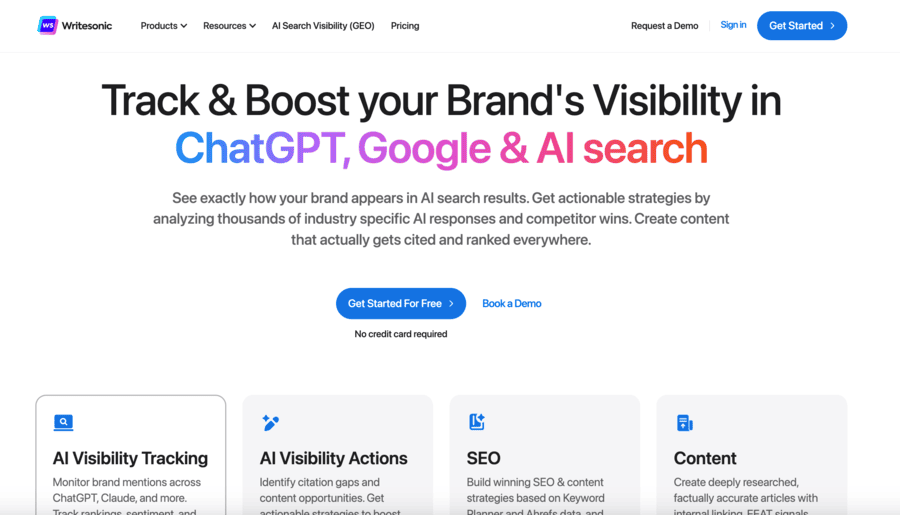
Best for: Quick social media campaigns and promotional content
Pricing: $49/month for the Lite plan
E-commerce Features: Social media campaign templates, product announcement formats, seasonal content calendars
Writesonic is the speed demon of AI writing tools. It's particularly effective for time-sensitive campaigns like flash sales, new product launches, or seasonal promotions. The tool can generate entire campaign sequences across multiple platforms in minutes.
Pros: Fast content generation, campaign-focused templates, affordable pricing
Cons: Less sophisticated brand voice training, limited long-form capabilities
Quick Tip: Look for tools with built-in product catalog integration. The best AI writing tools can automatically pull product names, descriptions, and pricing to create accurate, up-to-date content without manual input.
Visual Content & Product Showcase Tools
Visual content drives e-commerce sales, but creating professional-looking product photos and lifestyle imagery traditionally requires expensive photoshoots or graphic design skills. AI generation tools are completely changing the game, enabling you to produce stunning product showcases, lifestyle imagery, and even video content, without a professional studio.
4. Canva AI

Best for: Product mockups and branded social media graphics
Pricing: $15/month for Pro plan
E-commerce Features: Product mockup templates, brand kit integration, automated resizing for all platforms
Canva's AI features have evolved specifically for e-commerce needs. You can upload product photos and automatically generate lifestyle mockups, create branded templates that maintain consistency, and even generate background removal and replacement. The Magic Resize feature alone saves hours when adapting content for different social platforms.
Pros: User-friendly interface, extensive template library, excellent brand consistency tools
Cons: Limited advanced AI features compared to specialized tools, can look template-heavy
5. Midjourney
.png)
Best for: High-quality lifestyle imagery and creative product photography
Pricing: $10/month for the Basic plan
E-commerce Features: Product photography styles, lifestyle scene generation, brand aesthetic development
Midjourney creates stunning, professional-quality images that can showcase your products in aspirational settings. Perfect for creating lifestyle imagery that shows your products in use, seasonal campaigns, or artistic product photography that stands out in crowded social feeds.
Pros: Exceptional image quality, highly creative outputs, cost-effective compared to professional photography
Cons: Steeper learning curve, requires prompt engineering skills, Discord-based interface
6. Runway
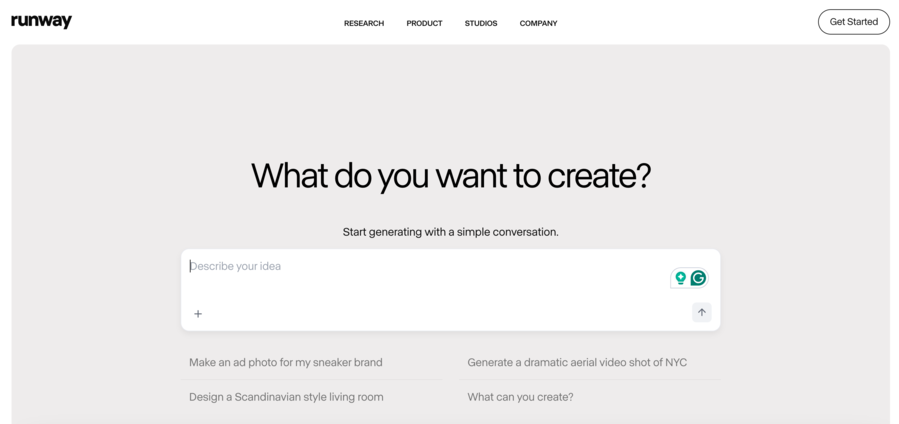
Best for: Product videos and dynamic social media content
Pricing: $15/month for Standard plan
E-commerce Features: Product demonstration videos, animated product showcases, social media video templates
Video content gets 48% more views than static posts, and Runway makes video creation accessible for e-commerce brands. You can create product demonstration videos, animated showcases, and even AI-generated lifestyle videos featuring your products.
Pros: Professional video quality, no video editing experience required, multiple output formats
Cons: Higher resource requirements, limited customization options, newer platform with evolving features
The key with visual AI tools is consistency. Choose one primary tool for your main visual style, then use others for specific needs. This approach maintains brand recognition while giving you flexibility for different types of content.
Scheduling & Publishing Automation
Once you've got content creation handled, the next challenge is getting everything published consistently across multiple platforms. Manual posting is not only time-consuming but also suboptimal – different platforms have different peak engagement times, and your audience behavior patterns change constantly.
7. Hootsuite
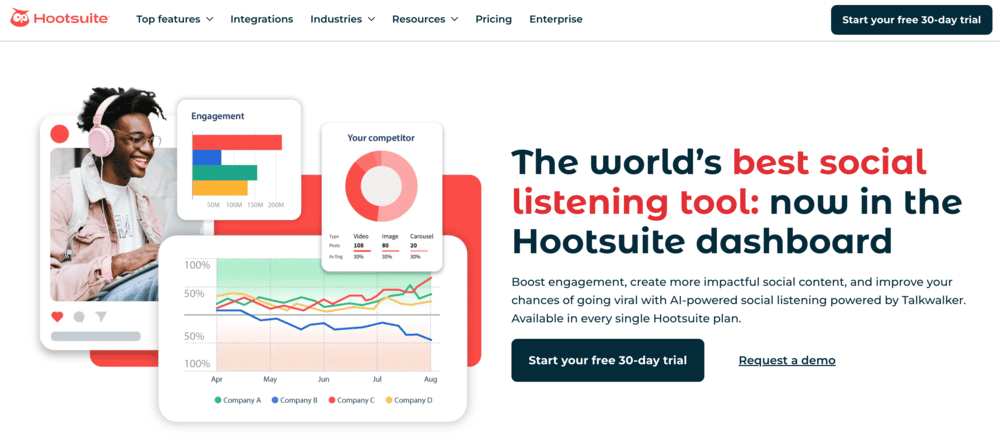
Best for: Enterprise-level scheduling and team collaboration
Pricing: $149/month for the Professional plan
E-commerce Features: Shopify integration, automated product posting, advanced analytics with sales attribution
Hootsuite remains the gold standard for comprehensive social media management. For e-commerce, its Shopify integration automatically creates posts when you add new products, and the analytics can track social media traffic all the way to completed purchases. The bulk scheduling feature is particularly valuable during busy seasons.
Pros: Comprehensive platform coverage, robust analytics, excellent team collaboration features
Cons: Higher price point, can be overwhelming for small businesses, steep learning curve
8. Buffer

Best for: Small to medium e-commerce businesses focused on simplicity
Pricing: $6/month for Essentials plan
E-commerce Features: Instagram Shopping integration, basic e-commerce analytics, simple product posting templates
Buffer strikes the perfect balance between functionality and simplicity. It's particularly strong for businesses just starting with social media automation. The Instagram Shopping integration allows you to tag products directly in posts, creating a seamless path from social media to purchase.
Pros: Intuitive interface, affordable pricing, excellent customer support
Cons: Limited advanced features, basic analytics compared to enterprise tools
9. SocialBee
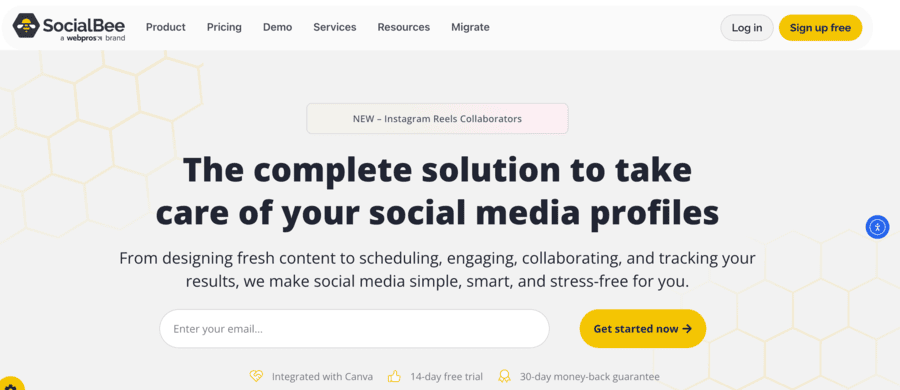
Best for: Content categorization and evergreen e-commerce content
Pricing: $29/month for Bootstrap plan
E-commerce Features: Product category posting, evergreen content recycling, seasonal campaign automation
SocialBee's unique strength is content categorization. You can set up different content buckets – new products, customer testimonials, educational content, promotional posts – and it automatically maintains the right mix. Perfect for e-commerce brands that want to avoid being too promotional while still showcasing products regularly.
Pros: Excellent content mix management, evergreen content recycling, good value for features
Cons: Smaller platform coverage, less sophisticated analytics
The secret to successful scheduling automation is understanding your audience's behavior patterns. Most AI scheduling tools can analyze your historical engagement data to recommend optimal posting times, but you should also consider your specific customer journey and buying patterns.
Social Media Advertising Tools
Paid social is the engine behind scalable e-commerce growth, but managing social media campaigns manually can drain time and budget. This category includes tools built to streamline and enhance your advertising workflow, whether through automation, performance tracking, creative testing, or advanced rule-setting.
10. Madgicx
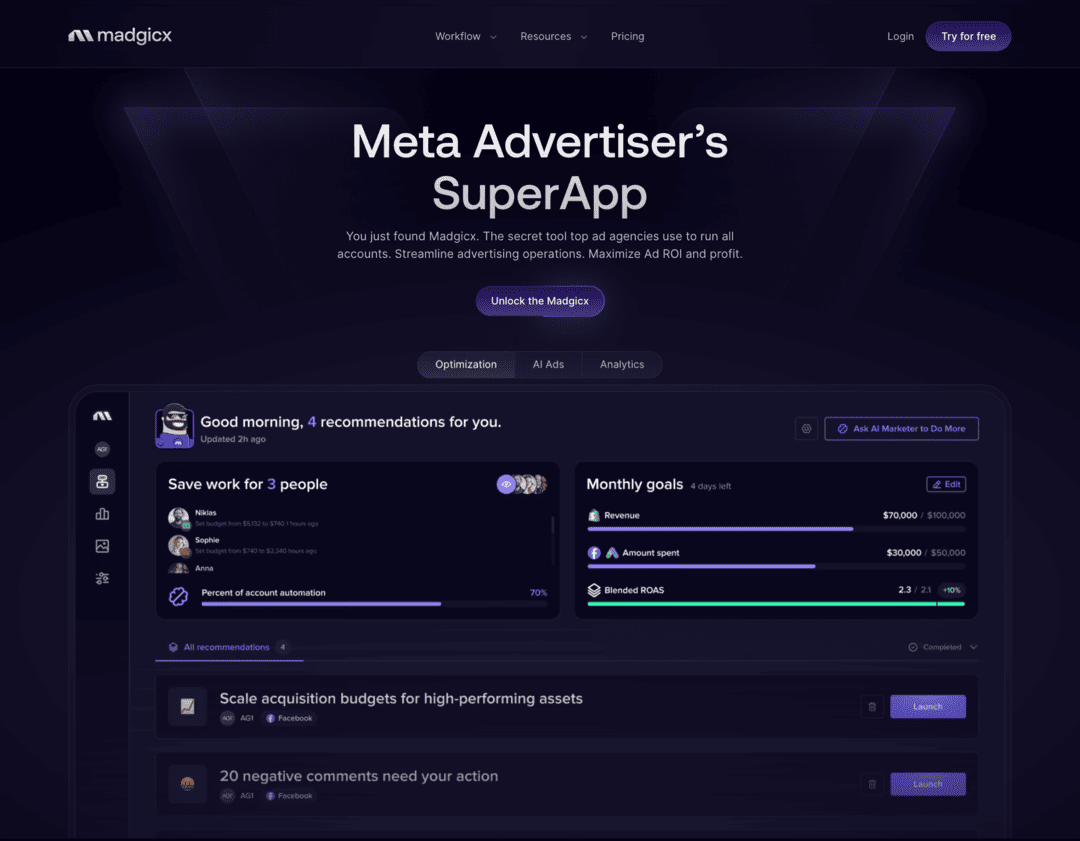
Best for: Integrated Meta advertising optimization for e-commerce
Pricing: Free 7-day trial available. After that, pricing starts at $99/month, depending on your ad spend.
E-commerce Features: Cross-platform attribution, automated optimization, paid advertising insights
What sets Madgicx apart is that it is purpose-built for Meta advertising. The AI-powered SuperApp offers e-commerce brands a competitive edge by automating every stage of social media advertising management. With tools like the AI Marketer for real-time performance optimization, the AI Ad Generator for instant, high-converting ad creation, and AI Bidding that reallocates budgets across audiences without touching your targeting. Plus, its integrated Business Dashboard unifies data from Meta, Google Ads, Shopify, TikTok, and more—giving you a full-funnel view of ad performance and ROI without the data sprawl.
Pros: It’s a one-stop shop for automation, ad management, analytics, targeting, and ad creation
Cons: Requires minimum ad spend, more complex setup than basic tools
Analytics & ROI Tracking Tools
Here’s where most e-commerce social media strategies fall apart: tracking actual return on investment. Likes and shares may boost vanity metrics, but they don’t pay the bills. You need tools with powerful social media analytics that connect engagement data to hard business outcomes—actual sales, customer acquisition costs, and lifetime value.
11. Sprout Social

Best for: Comprehensive social media analytics with advanced reporting
Pricing: $199/month for Standard plan
E-commerce Features: Revenue attribution tracking, customer journey mapping, advanced audience insights
Sprout Social offers the most sophisticated analytics for understanding how social media impacts your bottom line. Their Smart Inbox feature helps you track customer interactions from the first social media touch to the final purchase, giving you clear attribution data that most tools miss.
Pros: Excellent attribution tracking, comprehensive reporting, strong customer service features
Cons: Premium pricing may be overkill for smaller businesses
12. Emplifi
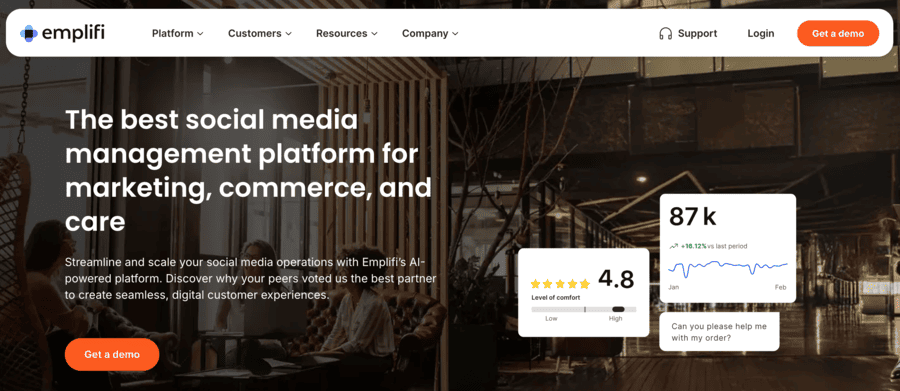
Best for: Competitive analysis and industry benchmarking
Pricing: Starts at $2,400/month for the Essential plan
E-commerce Features: Competitor product tracking, industry performance benchmarks, influencer identification
Understanding how your social media performance compares to competitors is crucial for e-commerce success. Emplifi provides detailed competitive analysis, showing you which types of content work best in your industry and identifying gaps in your strategy.
Pros: Excellent competitive intelligence, industry-specific insights, influencer discovery
Cons: High price point, complex interface, requires significant time investment to maximize value
The key to effective analytics is focusing on metrics that matter for your business model. For e-commerce, this typically means tracking cost per acquisition, customer lifetime value attribution, and revenue per social media follower rather than just engagement rates.
Customer Engagement & Support Tools
Social media isn't just a broadcasting channel for e-commerce – it's increasingly becoming a customer service and sales channel. Customers expect quick responses to questions about products, shipping, and returns. AI-powered engagement tools can handle routine inquiries while escalating complex issues to human team members.
13. ManyChat

Best for: E-commerce chatbots and automated customer journeys
Pricing: $15/month for Pro plan
E-commerce Features: Abandoned cart recovery, product recommendation bots, order status automation
ManyChat excels at creating sophisticated customer journeys through social media messaging. You can set up automated sequences that guide customers from product discovery to purchase, handle common questions about shipping and returns, and even recover abandoned carts through personalized messaging.
Pros: Excellent automation flows, strong e-commerce integrations, visual flow builder
Cons: Limited to Facebook and Instagram messaging, requires setup time for complex flows
14. Zendesk
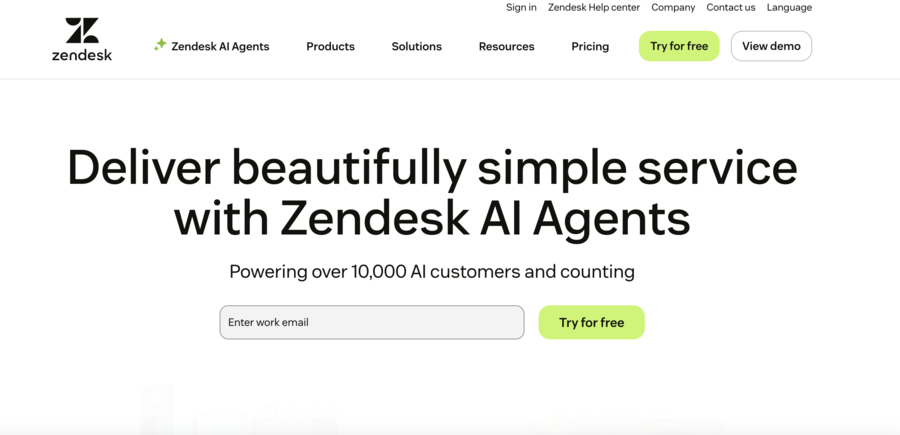
Best for: Comprehensive customer support across social platforms
Pricing: $69/month per agent for Suite Team
E-commerce Features: Social media ticket management, customer history integration, automated response suggestions
Zendesk treats social media as part of your overall customer support strategy. When customers reach out on social platforms, their inquiries become support tickets with full customer history, previous purchases, and context. This approach ensures consistent, informed responses regardless of which channel customers use.
Pros: Comprehensive customer context, excellent team collaboration, robust reporting
Cons: Higher cost per agent, may be overkill for businesses with simple support needs
15. Intercom
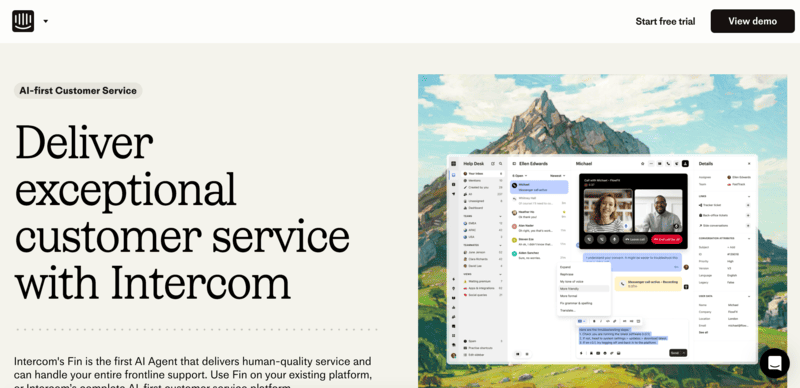
Best for: Proactive customer engagement and sales support
Pricing: $29/month for the Essential plan
E-commerce Features: Behavioral triggers, product usage tracking, automated sales sequences
Intercom's strength is proactive engagement. Instead of just responding to customer inquiries, it can initiate conversations based on customer behavior, product views, or cart abandonment. This proactive approach often leads to higher conversion rates and better customer relationships.
Pros: Proactive engagement capabilities, excellent user experience, strong automation features
Cons: Can feel intrusive if not configured properly, higher learning curve for advanced features
The most effective customer engagement strategies combine automated responses for common questions with human oversight for complex issues. The goal is to provide immediate value while building relationships that lead to repeat purchases and customer loyalty.
Implementation Guide for E-commerce Stores
Now that you understand the tools available, let's create a practical implementation roadmap. The key is starting small and scaling up rather than trying to implement everything at once. Here's a proven step-by-step process that works for e-commerce businesses of all sizes.
Step 1: Audit Your Current Social Media Performance
Before implementing any AI Marketing tools, you need baseline metrics. Export your current social media analytics for the past 3-6 months, focusing on:
- Engagement rates by post type and product category
- Traffic from social media to your website
- Conversion rates from social media traffic
- Time spent on social media management weekly
This audit will help you identify which platforms and content types are already working, so you can prioritize automation efforts where they'll have the biggest impact.
Step 2: Choose Your Core Tool Stack Based on Budget and Needs
Starter Budget ($50-$100/month):
- Content Creation: Writesonic ($49/month)
- Scheduling: Buffer ($6/month)
- Basic Analytics: Native platform insights
- Visual Content: Canva AI ($15/month)
- Customer Engagement: ManyChat ($15/month)
Growth Budget ($200-$500/month):
- Content Creation: Jasper ($49/month)
- Scheduling: SocialBee ($29/month)
- Analytics: Sprout Social ($199/month)
- Visual Content: Canva AI + Midjourney ($25/month)
- Customer Engagement: Intercom ($29/month)
Scale Budget ($1000+/month):
- Comprehensive Meta Ads Platform: Madgicx All-in-One ($99/month, ad spend based)
- Enterprise Scheduling: Hootsuite ($149/month)
- Advanced Analytics: Emplifi (starts at $2,400/month)
- Video Content: Runway ($15/month)
- Customer Support: Zendesk ($69/month per agent)
- Advanced Automation: Bïrch (starts at $49/month)
Step 3: Set Up Product Catalog Integration
This step is crucial for e-commerce automation. Most AI tools can integrate with your e-commerce platform to automatically pull product information, pricing, and inventory status. Set up these integrations first:
- Connect your Shopify/WooCommerce store to your chosen tools
- Configure automatic product import and updates
- Set up inventory-based posting rules (don't promote out-of-stock items)
- Create product category templates for consistent messaging
Step 4: Create Automated Posting Workflows
Design content workflows that maintain engagement without being overly promotional. A good rule of thumb for e-commerce is the 80/20 rule: 80% valuable content (tips, education, user-generated content) and 20% direct product promotion.
Sample Weekly Content Calendar:
- Monday: Educational content related to your products
- Tuesday: User-generated content or customer testimonials
- Wednesday: Behind-the-scenes or company culture content
- Thursday: Product spotlight or new arrival announcement
- Friday: Promotional content or special offers
- Weekend: Lifestyle content showing products in use
Step 5: Implement Tracking and Attribution
Set up proper tracking to measure ROI from your social media automation:
- Configure UTM parameters for all social media links
- Set up conversion tracking pixels on your website
- Create custom audiences based on social media engagement
- Implement cross-device tracking for accurate attribution
Step 6: Optimize Based on ROI Data
After 30-60 days of automated posting, analyze the data to optimize your approach:
- Identify which content types drive the most sales
- Adjust posting frequency based on engagement and conversion data
- Refine your content templates based on performance
- Scale up successful content formats and pause underperforming ones
The key to successful implementation is patience and iteration. Don't expect perfect results immediately – AI tools need time to learn your audience and optimize performance.
ROI Measurement Framework
Here's the part most e-commerce owners struggle with: actually measuring whether your AI social media management is profitable. Vanity metrics like followers and likes don't pay the bills. You need a concrete framework for calculating return on investment that connects social media activity to revenue.
Essential ROI Metrics for E-commerce Social Media
1. Cost Per Acquisition from Social Media
CPA = (Total Social Media Tool Costs + Time Investment) ÷ Number of Customers Acquired
Include all tool subscriptions, content creation time, and management overhead. Compare this to your CPA from other channels to determine if social media automation is cost-effective.
2. Revenue Per Social Media Follower
Revenue Per Follower = Total Revenue from Social Traffic ÷ Total Followers Across Platforms
This metric helps you understand the actual value of growing your social media audience. Focus on quality engagement over follower count.
3. Social Media Attribution to Customer Lifetime Value
Social CLV = Average Order Value × Purchase Frequency × Customer Lifespan (for social-acquired customers)
Customers acquired through social media often have different buying patterns from those acquired through other channels. Track this separately to understand long-term value.
4. Engagement to Conversion Rate
Conversion Rate = Social Media Conversions ÷ Total Social Media Traffic × 100
This helps you understand which types of content and engagement actually drive sales, not just likes and comments.
Advanced Attribution Techniques
UTM Parameter Strategy:
Create specific UTM codes for different content types:
utm_source=instagram&utm_medium=organic&utm_campaign=product_showcase
utm_source=facebook&utm_medium=organic&utm_campaign=educational_content
This granular tracking helps you understand which platforms and content types drive the most valuable traffic.
Cross-Device Tracking:
Modern customers often discover products on mobile social media but purchase on desktop. Use tools like Google Analytics 4 or Meta Pixel to track cross-device customer journeys.
First-Touch vs. Last-Touch Attribution:
Social media often plays an awareness role rather than a direct conversion. Track both first-touch attribution (initial discovery) and last-touch attribution (final conversion trigger) to understand social media's full impact.
Pro Tip: Use UTM parameters and pixel tracking for accurate attribution. Set up conversion tracking that follows customers from social media post to email signup to eventual purchase. This multi-touch attribution gives you a complete picture of social media's role in your sales funnel.
Monthly ROI Review Process
Week 1: Export all social media analytics and e-commerce data
Week 2: Calculate key metrics and compare to the previous month
Week 3: Identify top-performing content and optimization opportunities
Week 4: Implement changes and plan next month's content strategy
Remember, social media ROI isn't always immediate. Some customers need multiple touchpoints before purchasing, so track 30, 60, and 90-day attribution windows to get the complete picture.
Frequently Asked Questions
What's the best AI social media tool for small e-commerce businesses?
For small e-commerce businesses just starting with AI automation, I recommend beginning with Buffer for scheduling ($6/month) and Canva AI for visual content ($15/month). This combination gives you solid automation capabilities without overwhelming complexity or high costs. As you grow, you can add Writesonic for content creation ($49/month) to complete your basic stack for under $70/month total.
The key is starting simple and scaling up. Many small businesses make the mistake of trying to implement too many tools at once, which leads to confusion and poor results. Master the basics first, then expand your toolkit as your needs grow.
How much should I budget for AI social media management?
Budget planning depends on your current revenue and growth goals:
- Startup Phase (Under $10K monthly revenue): $100-$200/month
- Growth Phase ($10K-$50K monthly revenue): $200-$500/month
- Scale Phase ($50K+ monthly revenue): $1000+/month
Remember to factor in the time savings when calculating ROI. If AI tools save you 10 hours per week at a $25/hour value, that's $1,000/month in time savings alone. Most businesses find that proper AI implementation pays for itself within 60-90 days through increased efficiency and better results.
Can AI tools integrate with Shopify and other e-commerce platforms?
Yes, most modern AI social media tools offer direct integrations with major e-commerce platforms. Shopify has the best integration support, with tools like Hootsuite, Buffer, and Madgicx offering automatic product imports, inventory tracking, and sales attribution.
WooCommerce and BigCommerce also have good integration options, though sometimes requiring additional plugins or API connections. The key integrations to look for are automatic product catalog sync, inventory-based posting rules, and conversion tracking that connects social media activity to actual sales.
How do I track sales from AI-generated social media content?
Effective sales tracking requires a multi-layered approach:
- UTM Parameters: Use specific tracking codes for each post type and platform
- Conversion Pixels: Install Facebook Pixel and Google Analytics for cross-platform tracking
- Customer Journey Mapping: Track customers from first social media interaction to final purchase
- Attribution Windows: Monitor 7-day, 30-day, and 90-day conversion windows
Tools like Madgicx excel at this comprehensive tracking, connecting social media engagement directly to revenue. For businesses using multiple tools, Google Analytics 4 provides excellent cross-platform attribution when properly configured.
Will AI tools work for B2B e-commerce or just B2C?
AI social media tools work excellently for B2B e-commerce, though the strategy differs from B2C approaches. B2B typically requires:
Longer Content Formats: LinkedIn articles and detailed product explanations
Educational Focus: More emphasis on industry insights and problem-solving content
Professional Tone: AI tools like Jasper excel at maintaining a professional brand voice
Lead Nurturing: Longer sales cycles require sustained engagement over months
Tools like Hootsuite and Sprout Social offer B2B-specific features like LinkedIn integration and lead scoring. The key is configuring your AI tools for longer sales cycles and relationship-building rather than immediate conversions.
Transform Your Social Media Into a Profit Center
The e-commerce landscape has fundamentally changed. While your competitors are still manually posting and hoping for the best, smart business owners are leveraging AI to create systematic, profitable social media operations. The 15 tools we've covered represent the cutting edge of what's possible when you combine artificial intelligence with strategic e-commerce advertising.
Remember the key principles we've discussed: start with a clear ROI framework, choose tools that integrate with your e-commerce platform, and focus on automation that enhances rather than replaces human creativity. The businesses seeing 15%-25% higher engagement rates aren't just using AI tools – they're using them strategically as part of a comprehensive growth system.
Your next step is simple: choose one tool from this guide and implement it this week. Whether you start with content creation, scheduling automation, or analytics tracking, the important thing is to begin. As you see results and save time, you can gradually expand your AI toolkit to create the fully automated social media profit center your business deserves.
The future of e-commerce social media is here, and it's powered by AI. The question isn't whether you'll eventually adopt these tools – it's whether you'll be an early adopter who gains a competitive advantage, or a late adopter playing catch-up. Based on our analysis of successful e-commerce brands using AI advertising tools, those who implement AI social media management now are positioning themselves for sustained growth in an increasingly competitive marketplace.
The tools are ready, the strategies are proven, and the ROI is measurable. Your automated, profitable social media operation is just one decision away.
Ready to stop babysitting your ad account and start scaling like a pro? Madgicx automates the high-stakes Meta ad decisions that usually demand expert-level skill and constant oversight, saving you time while you maximize ROAS without lifting a finger.
Start Your 7-Day Free Trial and experience the power of automated ad optimization trusted by thousands of e-commerce brands.
Stop spending hours on social posts that don't convert. Madgicx is the AI marketing SuperApp built for e-commerce brands that want to scale smarter. It automates Meta ad creation, optimizes ads in real time, and gives you back the hours you used to spend micromanaging campaigns.
Digital copywriter with a passion for sculpting words that resonate in a digital age.




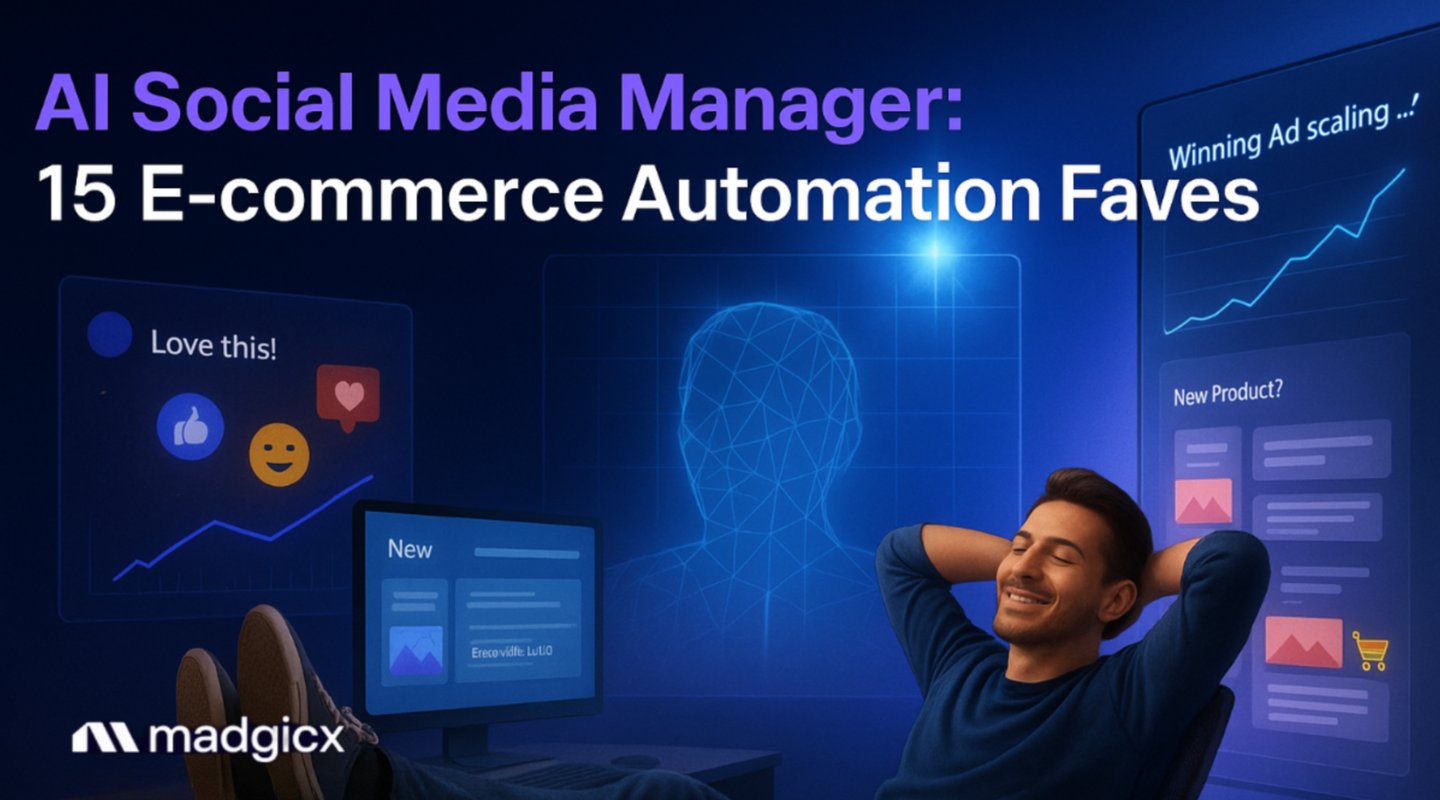


.avif)






.jpg)
